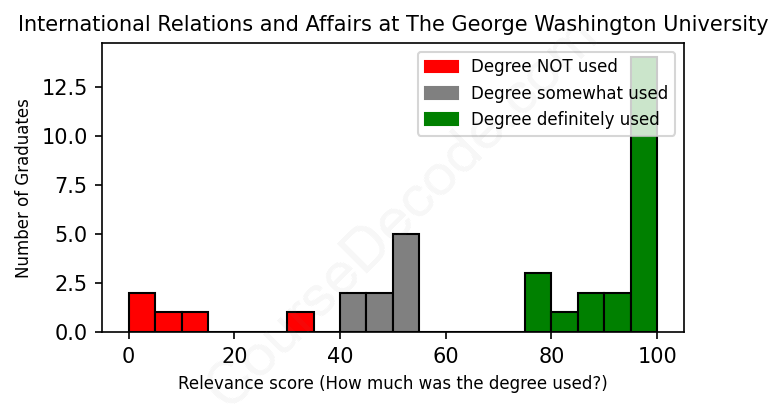
First, some facts. Of the International Relations and Affairs graduates from The George Washington University we've analyzed , here's how many have used (or NOT used) their degree in their career:

These are estimates based on AI analysis of 36 LinkedIn profiles (see below).
The verdict? Slightly above average. Overall, with an average relevance score of 70%, International Relations and Affairs graduates from The George Washington University have a slightly higher likelihood (+3%) of finding work in this field compared to the average graduate across all fields:
And for comparison, here's the chart for all profiles we've looked at across all degrees.
Also, after graduating, 36% of these graduates have pursued further education other than another Bachelor's degree (such as a Masters degree or other), compared to the average across all profiles of 35%. This suggests you may need more than just a Bachelors degree to be competitive as a International Relations and Affairs graduate.
See the details:
|
Relevance score: 0% We think this person has NOT gone into a career related to their degree. We think this person has NOT gone into a career related to their degree.
DEGREE INFOGraduated in 2023 from The George Washington University with a Bachelor's degree in International Relations and Affairs. No other secondary education since. JOB HISTORY SINCE GRADUATIONNotetaker United States Institute of Peace Jun 2023 - Jun 2023 Sales Employee  [solidcore] Jan 2023 - Nov 2023 Bartender  Sign Of The Whale Jan 2023 - Nov 2023 ABOUTNo information provided. |
The top 10 most common jobs done by the graduates we've analyzed (ranked most common to least) are:
When looking at the job paths of graduates with a degree in International Relations and Affairs from The George Washington University, a clear trend emerges. A significant number of individuals have continued their careers in roles that relate closely to international affairs, particularly within government agencies like USAID, the U.S. Department of State, and various NGOs. Positions such as Program Officers, Legislative Analysts, and roles at institutions like the United States Institute of Peace show a genuine application of their academic background in international relations. These jobs often require a nuanced understanding of global issues, policy-making, and diplomatic processes, which aligns well with the knowledge acquired during their studies.
However, it’s notable that not all graduates have found themselves in positions that leverage their degree directly. A handful of alumni have taken roles in industries like marketing, customer service, and even education, where their specific training in international relations might not be as applicable. While some of these roles might still benefit from skills like communication, analysis, or problem-solving that are honed in the International Relations program, they don't necessarily make use of the core knowledge about global issues, diplomacy, or international law that these graduates learned. So overall, while many graduates have ventured into relevant and impactful careers, others seem to be seeking opportunities outside the traditional paths of international relations, which could dilute the direct relevance of their degree in their job roles.
Here is a visual representation of the most common words in job titles for International Relations and Affairs graduates (this is across all International Relations and Affairs graduates we've analyzed, not just those who went to The George Washington University):

Graduates from The George Washington University who majored in International Relations and Affairs tend to find themselves on paths quite aligned with their studies. Many start their careers with internships or entry-level positions that are closely related to international affairs, such as program assistants, analysts, or various roles within government agencies like USAID or the State Department. For example, the majority of those who graduated in the early 2010s have found steady employment in reputable organizations, moving up the ranks to positions like Program Officer or Legislative Advisor within a few years. This suggests that their early experiences are not only relevant but also help them build a solid foundation for long-term careers in international relations, policy-making, or government roles.
As time goes on, like five to ten years after their graduation, many alumni continue to advance further in their respective fields. A notable number have successfully transitioned into senior roles at acclaimed institutions such as the United Nations, various nonprofit organizations, or in legislative affairs. It's also worth mentioning that while some individuals have drifted into unrelated jobs or temporary positions several years post-graduation, the majority appear to stay within the realm of international relations or public policy, which is encouraging. Overall, it looks like many graduates from GWU are thriving in careers relevant to their degrees, demonstrating that a degree in International Relations and Affairs can indeed lead to fulfilling and significant work in today’s global landscape.
Getting a Bachelor’s degree in International Relations and Affairs at The George Washington University can be quite challenging, but it really depends on your interests and strengths. GW has a reputation for being rigorous, and the coursework often dives deep into complex topics like global politics, economics, and diplomacy. You'll likely find yourself juggling lots of readings, research papers, and maybe even a foreign language or two, which can feel overwhelming if that’s not your forte. That said, if you’ve got a passion for understanding how the world works and you enjoy discussions and debates about international issues, you might find it really engaging rather than super tough. Overall, it's probably on the harder side compared to some other degrees, but it can also be really rewarding if you’re into it!
Most commonly, in the LinkedIn profiles we've looked at, it takes people 4 years to finish a Bachelor degree in International Relations and Affairs.
When looking at the job trajectories of these International Relations graduates from The George Washington University, it seems like many of them have moved towards pretty stable and potentially lucrative careers, especially those who have landed roles in federal agencies or prominent organizations like the United Nations and USAID. Positions like Program Officer or Legislative Advisor often come with decent salaries and benefits, particularly as you gain experience and move up the ranks. However, not all graduates have jumped into high-paying roles right away—some started with internships or entry-level positions, which can pay less. It’s a mixed bag; while some are probably doing well, others might still be climbing the ladder. Overall, it looks promising for the majority, especially as they gain experience in the field.
Here is a visual representation of the most common words seen in the "about" section of LinkedIn profiles who have a Bachelor degree in International Relations and Affairs (this is across all International Relations and Affairs graduates we've analyzed, not just those who went to The George Washington University). This may or may not be useful:

Here are all colleges offering a Bachelor degree in International Relations and Affairs (ordered by the average relevance score of their International Relations and Affairs graduates, best to worst) where we have analyzed at least 10 of their graduates:
| College | Score | Count |
|---|---|---|
 The George Washington University The George Washington University
|
70 | 36 |
 American University American University
|
64 | 21 |
 Boston University Boston University
|
63 | 12 |
 The University of Georgia The University of Georgia
|
56 | 21 |
 University of Southern California University of Southern California
|
56 | 13 |
 James Madison University James Madison University
|
53 | 11 |
 University of California, Davis University of California, Davis
|
50 | 11 |
 University of Colorado Boulder University of Colorado Boulder
|
49 | 16 |
 Florida International University Florida International University
|
47 | 36 |
 Florida State University Florida State University
|
45 | 29 |